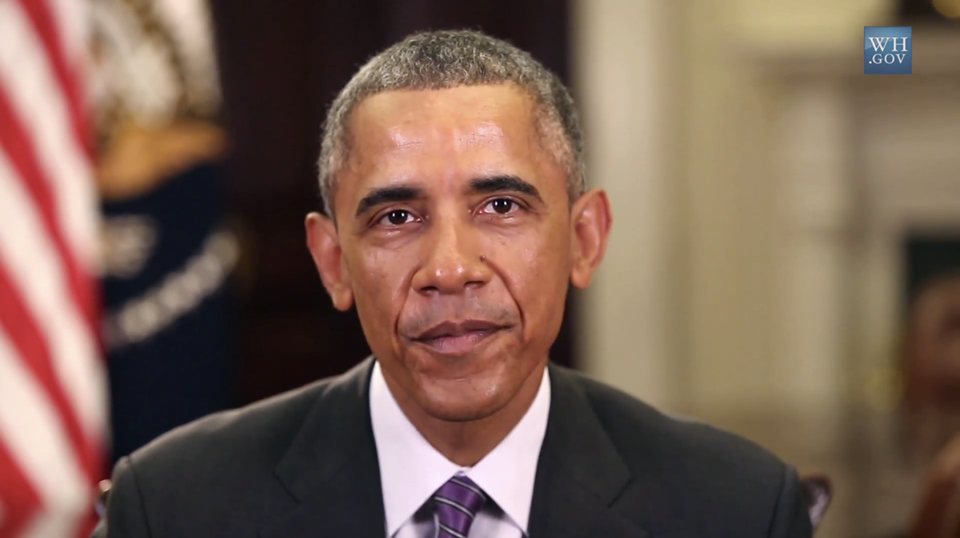
TORONTO — The word had barely slipped from President Barack Obama’s lips before the first headlines were being written.
A sitting U.S. president, the first African American commander-in-chief in the country’s history, had uttered in an interview a word that is widely considered to be one of the biggest verbal taboos.
It quickly begged the question: Is it ever OK to say the N-word?
People who have thought about and written about that very issue reacted with wariness and some fatigue to the question, coming as it does in the context of Obama’s comments, which related to last week’s racially inspired killing of nine people at a historic African American church in Charleston, S.C.
They argued the debate over the president’s choice of words is overshadowing the message Obama was trying to convey — that just because it is now unacceptable to use the N-word in most social settings does not mean racism has been uprooted from modern day America.
Eric Deggans, a Florida-based TV critic for NPR Radio, expressed dismay at the focus of the coverage of Obama’s interview with comedian and podcaster Marc Maron. For him, the use of the N-word was a side issue.
“Frankly I think it’s disappointing that there are so many media outlets that are focused on the fact that he’s used the word,” said Deggans, author of “Race-Baiter,” a book that explores how racial issues play out in the media.
“Because what he was talking about is a bigger issue and a more appropriate issue than the fact that he used the word. But once again we end up getting sidetracked and tangled up in these side issues that are not about the core issue that he’s trying to talk about… It’s just another way of avoiding talking about the stuff that’s the most uncomfortable.”
For Deggans, one of those uncomfortable topics is the fact that one of the victims — Rev. Clementa Pinckney, the church’s pastor and a state senator — was to lie in state in the South Carolina capitol building, which flies the Confederate flag on its grounds.
The flag is widely seen as a symbol of the American South’s slave-owning past. South Carolina has been under pressure to remove the flag and the state’s lawmakers agreed Tuesday to consider a call from Gov. Nikki Haley to take it down.
“This guy got killed by a racist. And now his body is going to lie in state underneath a symbol of the Confederacy. Let’s talk about that,” said Deggans, an African American who recalls first being called the N-word when he was in middle school.
“Let’s talk about what the resistance to removing what that symbol symbolizes. Let’s talk about that.”
Georgetown University law professor Sheryll Cashin was not harshly critical of Obama for having said the word, saying she thought it was a mistake. She hopes it is a word choice Obama and others would avoid in future.
“The word is nuclear in the United States,” said Cashin, an African American and the author of “Place Not Race,” which argues equal opportunity programs ought to focus on disadvantaged children regardless of their colour.
“What I worry about most when the president of the United States uses a word like that — or when anybody does, particularly an African American — that somebody who hears it may feel that they have licence to use it. And I just think that it’s not a word that should be used casually.”
Cashin admitted the N-word was frequently heard in her household — often as a term of affection — when she was growing up. But as a mother, she does not allow use of the word in her home. And she does not use it with her students.
“I would never use that word in my class, even if we’re talking about a case where people used it. I would say ‘the N-word’ because I want to model the behaviour that I want others to do,” she said.
“It’s such an ugly, nasty word.”
Prof. Neal Lester rarely utters the word either, even though he teaches a course on the N-word at Arizona State University. Lester, an English professor, makes an exception if he’s reading a text that has the word in it.
He finds the appropriation of the word by rappers and some young black people unsettling. Though they often use an alternate spelling — ending the word with an “a” or “ah” –it doesn’t make the word acceptable, suggested Lester, who is also African American.
“Young people and old people, black people and white people know that this is a problematic word,” he said.
“People have tried to hide behind changing the word. I do think there is an ignorance that somehow we have evolved in such a way that we can use the word and it’s free of all the negativity that has been associated with it historically. But that’s clearly not true. And Charleston, S.C., is yet one more piece of evidence of that.”
Deggans agreed.
“I just feel there’s a little piece of the word that is always going to be connected to degrading us as a people,” he said. “And we hold onto that when we accept the use of that word in that way. I think we’d be better off if we stopped doing it.”